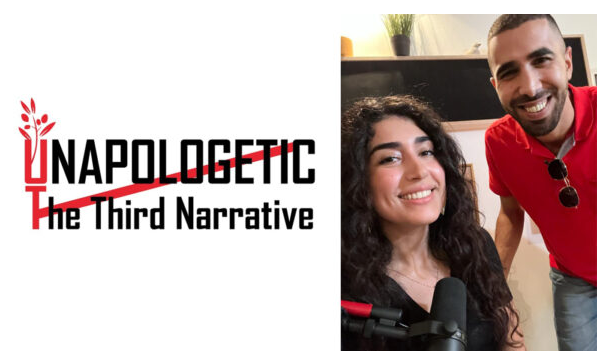The Third Narrative initiative was founded by American Jews with deep ties to Israel who see no
contradiction between being pro-Israeli and pro-Palestinian. We’re delighted to find new Palestinian voices who, like us, insist on respecting the needs and feeling the pain of people on both sides, denouncing extremists and appreciating the complexities of the conflict.
Two of them reached the same conclusion we did: the need for a “third narrative.” So they used our name, but we don’t mind. Names, in contrast to people, can co-exist easily.
‘Unapologetic: The Third Narrative’ Podcast
Pictured above with their “Unapologetic: The Third Narrative” logo are Amira Mohammed from Sheikh Jarrah in East Jerusalem and Ibrahim Abu Ahmad from Nazareth. They are both self-described “Palestinian-Israelis” (Ms. Mohammed and her parents have Israeli citizenship, unlike most Arabs in East Jerusalem). Their podcast commenced on October 27th and is available (in English) on both Spotify and Apple.
Both are millennial peace activists who work for ROPES, The Regional Organization for Peace, Economics & Security, which connects forward-thinking, emerging Israeli and Palestinian leaders with likeminded peers in the region. Both aspire to be a “link” between Palestinians and Israelis, because “we can look at the world through Palestinian as well as Israeli eyes,” Ahmad asserts in the first episode.
They unequivocally condemn the Hamas attack on October 7th: “Because we were both…raised here, we have friends who are Jewish, colleagues, comrades…I have lots of friends who lost friends.” Ahmad says, to which Mohammed responds, “Likewise.” Yet, of course, they’re also worried about their friends and others in Gaza as the Israelis wage war. Ahmad insists that they “want to be unapologetic about feeling the pain on both sides.” They’re speaking our language, as noted here.
Their target audience includes pro-Palestinian activists abroad, some of whom they often excoriate. Mohammed says:
What the West created is a kind of black and white. You’re either pro-Israeli or pro-Palestinian. If you don’t sit with everything within the pro-Palestinian community, you’re on the other side, you’re pro-Israel. So people who are pro-Palestinian feel like they can’t speak against Hamas…What we want to create here…is a third narrative in the West.
Welcome to the club!
They Still Support a Two-State Solution
At a moment when I’m deeply worried that the Hamas attack and Israel’s counterattack have finally pulled the intubation tube from the two-state solution, it’s heartening to hear from two young peace activists who haven’t given up. “The only way forward is a two-state solution, a real one in which both sides are able to have their own rights of self-determination and prosperity,” according to Ahmad.
They are highly critical of Israeli settlement expansion and settler violence, but also denounce Palestinian “armed struggle” and call the Palestinian Authority “corrupt.” As Mohammed puts it:
Our call for changing the path does not exclusively blame one side or the other. We’re unapologetically saying we all fucked up, we all need to change and we all need to accept the fact that we all need to change.
In a subsequent episode, they offer critiques of the “peace-building camp,” including Arab-Jewish dialogue and encounter programs that nurtured them when they were young, and which they still believe are critical to building a constituency for peace on both sides.
One can hear them struggle to come up with concrete suggestions for the so-called “day after,” and to find a path forward. I found it compelling to learn about the dilemmas and challenges that confront them. For example, Mohammed describes the difficulties of conveying their message to “conservative Arab families” like hers, who are deeply suspicious of initiatives that seem to be created and led by Zionists and allow young men and women to attend the same meetings.
They’ve broadcast seven episodes thus far, and it’s worth listening to each and every one.
Former Gazan Mourns Personal Losses, but Retains Hope for Peace
In the same spirit, Ahmed Fouad Alkhatib, who used to live in Gaza and is now a US citizen, wrote a moving piece in The Atlantic published on January 9th. It is entitled, “Israel Killed My Family, but Not My Hope: Although I’ve lost many relatives, I still believe Palestinians and Israelis can embrace a different path.”
Some of it is a detailed critique of Hamas, which, in the 1990s “made belief in the peace process seem toxic, unpopular, treacherous, and cowardly among Palestinians. Through its horrendous yet skillfully executed violence, Hamas instead injected new life into the resistance narrative, which promoted a perpetual armed struggle to liberate all of Palestine.” Now, Alkhatid forcefully rejects this path:
October 7 was the deadliest attack in Israel’s history, and the single deadliest day that
Jews have experienced since the Holocaust. The shock of this event has pushed some
Israelis to seek revenge, inflict violence, or vent their rage against Gazans. Many
Palestinians feel their own rage against Israel and what the Zionist project has come to
symbolize, after facing 75 years of violence, occupation, and displacement.The only way forward for both peoples is to make the difficult yet courageous decision
to acknowledge their traumas and mutual humanity while recognizing that their fates,
safety, and well-being are inextricably interconnected.That starts with a just and equitable framework for the Palestinians to obtain political
rights and the freedom of self-determination. Additionally—and the recent horrors in
Gaza will delay this—the Palestinian people must come to terms with the futility of
the armed resistance that has been sold to them by bad-faith actors like Hamas and its
regional backers, and reckon with the limits of what can be obtained.Resistance to occupation is a legitimate right, but it does not offer a blank check to
commit violence against innocent people. There is a difference between what is
effective and moral, and what is misguided and suicidal.
To all three of them, I say “Thank you, shukran and todah.”
Dan Fleshler